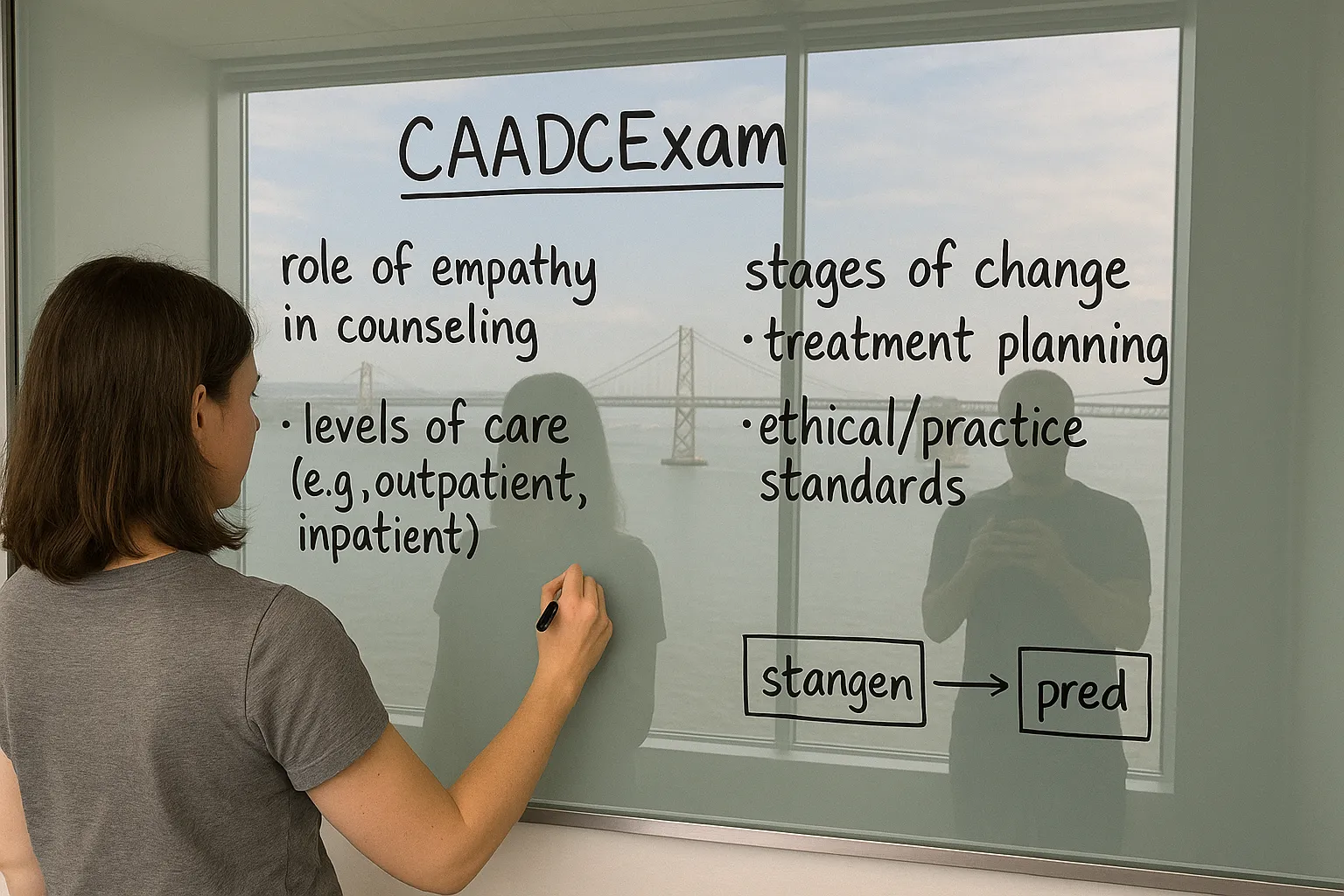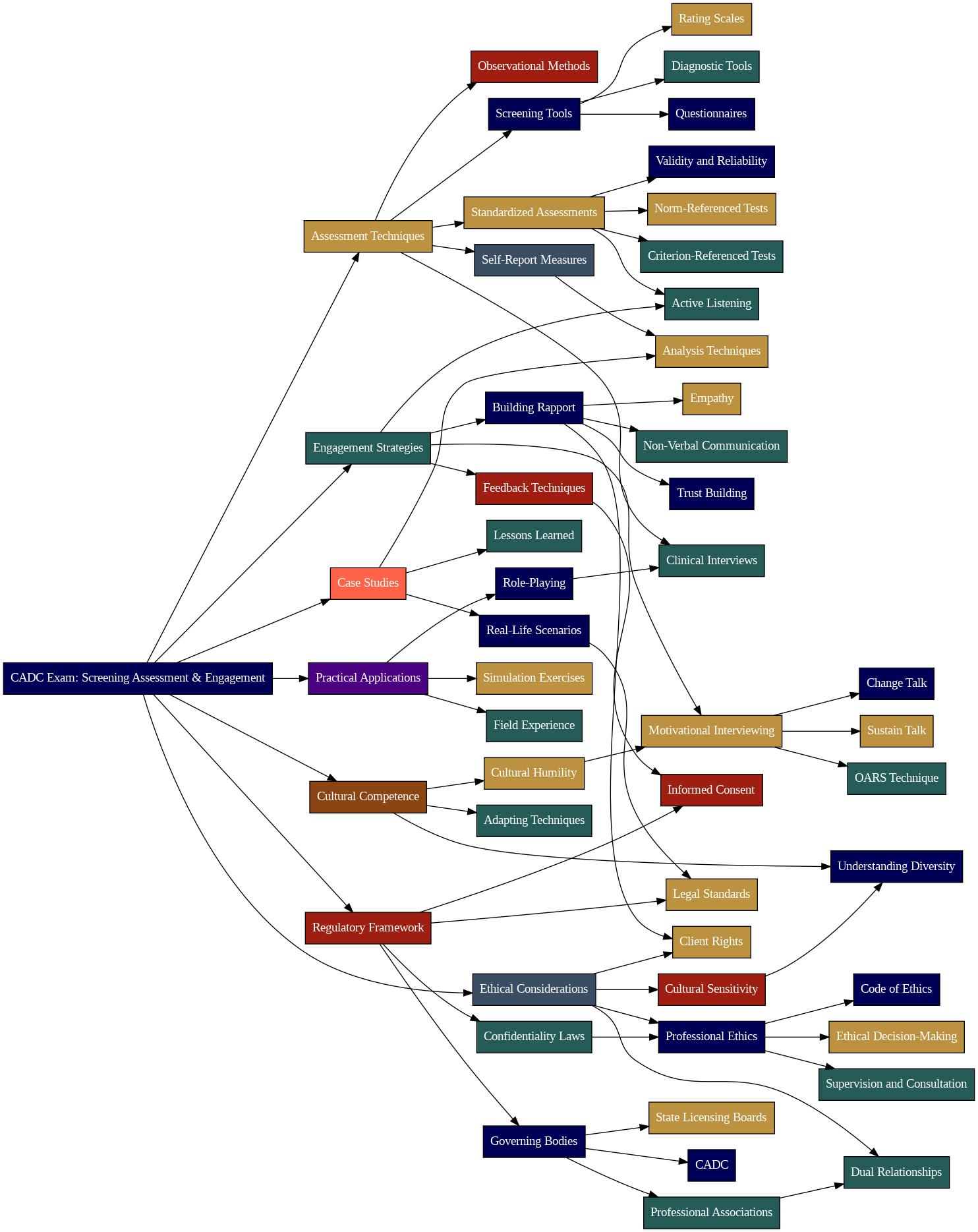Quiz-summary
0 of 30 questions completed
Questions:
- 1
- 2
- 3
- 4
- 5
- 6
- 7
- 8
- 9
- 10
- 11
- 12
- 13
- 14
- 15
- 16
- 17
- 18
- 19
- 20
- 21
- 22
- 23
- 24
- 25
- 26
- 27
- 28
- 29
- 30
Information
Premium Practice Questions
You have already completed the quiz before. Hence you can not start it again.
Quiz is loading...
You must sign in or sign up to start the quiz.
You have to finish following quiz, to start this quiz:
Results
0 of 30 questions answered correctly
Your time:
Time has elapsed
Categories
- Not categorized 0%
- 1
- 2
- 3
- 4
- 5
- 6
- 7
- 8
- 9
- 10
- 11
- 12
- 13
- 14
- 15
- 16
- 17
- 18
- 19
- 20
- 21
- 22
- 23
- 24
- 25
- 26
- 27
- 28
- 29
- 30
- Answered
- Review
-
Question 1 of 30
1. Question
A 16-year-old client, Maria, is voluntarily seeking substance use counseling from a LADC in Massachusetts. During a session, Maria discloses that her stepfather regularly physically abuses her younger sibling. Maria begs the counselor not to tell anyone, fearing it will make the abuse worse. According to Massachusetts law and ethical guidelines for LADCs, what is the MOST appropriate course of action for the counselor?
Correct
In Massachusetts, Licensed Alcohol and Drug Counselors (LADCs) operate under specific ethical guidelines related to client confidentiality, particularly when dealing with minors. While generally, client information is protected, exceptions exist. According to Massachusetts law and ethical standards, a LADC has a duty to report suspected child abuse or neglect, even if the client is a minor seeking substance use treatment. This obligation supersedes typical confidentiality protections to ensure the child’s safety. The LADC must also consider the minor’s best interests and the potential impact on the therapeutic relationship when making disclosure decisions. Consultation with supervisors and legal counsel is recommended to navigate these complex ethical and legal situations. The LADC should document all actions taken and the rationale behind them. Furthermore, it is crucial to understand the nuances of Massachusetts General Laws Chapter 119, Section 51A, which outlines the mandatory reporting requirements for suspected child abuse and neglect. Failure to report suspected abuse can result in legal penalties for the LADC. The LADC must also be aware of the limitations of a minor’s right to confidentiality, especially concerning medical or mental health treatment, as parental consent may be required in certain situations.
Incorrect
In Massachusetts, Licensed Alcohol and Drug Counselors (LADCs) operate under specific ethical guidelines related to client confidentiality, particularly when dealing with minors. While generally, client information is protected, exceptions exist. According to Massachusetts law and ethical standards, a LADC has a duty to report suspected child abuse or neglect, even if the client is a minor seeking substance use treatment. This obligation supersedes typical confidentiality protections to ensure the child’s safety. The LADC must also consider the minor’s best interests and the potential impact on the therapeutic relationship when making disclosure decisions. Consultation with supervisors and legal counsel is recommended to navigate these complex ethical and legal situations. The LADC should document all actions taken and the rationale behind them. Furthermore, it is crucial to understand the nuances of Massachusetts General Laws Chapter 119, Section 51A, which outlines the mandatory reporting requirements for suspected child abuse and neglect. Failure to report suspected abuse can result in legal penalties for the LADC. The LADC must also be aware of the limitations of a minor’s right to confidentiality, especially concerning medical or mental health treatment, as parental consent may be required in certain situations.
-
Question 2 of 30
2. Question
A Massachusetts LADC, Fatima, is working with a client, Javier, who is struggling with opioid addiction. During a session, Javier expresses intense anger towards his former employer, who recently fired him. Javier states, “I feel like going down there and teaching them a lesson they’ll never forget.” Fatima assesses Javier’s demeanor as agitated but not presenting an immediate, credible threat. Later, Javier discloses he has been using heroin again after a period of sobriety and is experiencing withdrawal symptoms. Considering the ethical and legal obligations of a Massachusetts LADC, what is Fatima’s MOST appropriate course of action?
Correct
In Massachusetts, Licensed Alcohol and Drug Counselors (LADCs) have specific ethical obligations when it comes to client confidentiality and duty to warn. The duty to warn, stemming from the Tarasoff ruling and subsequent interpretations in Massachusetts law, mandates that a therapist must take reasonable steps to protect a potential victim when a client poses a serious threat of physical violence. This duty supersedes confidentiality. What constitutes a “serious threat” and “reasonable steps” is determined by the specific circumstances, guided by professional judgment and legal precedents. Reporting suspected child abuse or neglect is also mandated under Massachusetts law, and this obligation takes precedence over client confidentiality. The counselor must report such suspicions to the Department of Children and Families (DCF). Counselors also have a responsibility to maintain professional boundaries and avoid dual relationships that could impair their judgment or exploit the client. This includes avoiding business relationships, close personal friendships, or sexual relationships with clients. Counselors must also adhere to the ethical principles outlined by relevant professional organizations and licensing boards, such as the Code of Ethics of the National Association for Alcoholism and Drug Abuse Counselors (NAADAC). The standard of care is what a reasonable and prudent LADC with similar training would do in a similar circumstance in Massachusetts. This requires the counselor to exercise sound professional judgment, stay informed about current best practices, and seek consultation when necessary.
Incorrect
In Massachusetts, Licensed Alcohol and Drug Counselors (LADCs) have specific ethical obligations when it comes to client confidentiality and duty to warn. The duty to warn, stemming from the Tarasoff ruling and subsequent interpretations in Massachusetts law, mandates that a therapist must take reasonable steps to protect a potential victim when a client poses a serious threat of physical violence. This duty supersedes confidentiality. What constitutes a “serious threat” and “reasonable steps” is determined by the specific circumstances, guided by professional judgment and legal precedents. Reporting suspected child abuse or neglect is also mandated under Massachusetts law, and this obligation takes precedence over client confidentiality. The counselor must report such suspicions to the Department of Children and Families (DCF). Counselors also have a responsibility to maintain professional boundaries and avoid dual relationships that could impair their judgment or exploit the client. This includes avoiding business relationships, close personal friendships, or sexual relationships with clients. Counselors must also adhere to the ethical principles outlined by relevant professional organizations and licensing boards, such as the Code of Ethics of the National Association for Alcoholism and Drug Abuse Counselors (NAADAC). The standard of care is what a reasonable and prudent LADC with similar training would do in a similar circumstance in Massachusetts. This requires the counselor to exercise sound professional judgment, stay informed about current best practices, and seek consultation when necessary.
-
Question 3 of 30
3. Question
A Massachusetts LADC, Fatima, primarily provides individual counseling for substance use disorders. A client, struggling with severe anxiety related to past trauma, requests Eye Movement Desensitization and Reprocessing (EMDR) therapy. Fatima has attended a weekend workshop on EMDR but lacks comprehensive training and supervised experience in this specific modality. Ethically, what is Fatima’s MOST appropriate course of action?
Correct
In Massachusetts, Licensed Alcohol and Drug Counselors (LADCs) operate under a specific scope of practice defined by state regulations. This scope dictates the services they are legally permitted to provide. Engaging in activities outside this defined scope constitutes a violation of professional ethics and state law, potentially leading to disciplinary actions, including license suspension or revocation. The key is whether the LADC is trained and competent to provide the specific service, and whether the service falls within the legally defined scope of practice for an LADC in Massachusetts. Referring to a qualified professional is ethically responsible. Offering services outside the scope of practice can lead to ineffective or harmful treatment, as the counselor may lack the necessary expertise to address the client’s needs adequately. It also undermines the integrity of the profession and can erode public trust in counseling services. Ethical decision-making models emphasize the importance of competence and acting in the client’s best interest, which includes recognizing and respecting the boundaries of one’s professional capabilities.
Incorrect
In Massachusetts, Licensed Alcohol and Drug Counselors (LADCs) operate under a specific scope of practice defined by state regulations. This scope dictates the services they are legally permitted to provide. Engaging in activities outside this defined scope constitutes a violation of professional ethics and state law, potentially leading to disciplinary actions, including license suspension or revocation. The key is whether the LADC is trained and competent to provide the specific service, and whether the service falls within the legally defined scope of practice for an LADC in Massachusetts. Referring to a qualified professional is ethically responsible. Offering services outside the scope of practice can lead to ineffective or harmful treatment, as the counselor may lack the necessary expertise to address the client’s needs adequately. It also undermines the integrity of the profession and can erode public trust in counseling services. Ethical decision-making models emphasize the importance of competence and acting in the client’s best interest, which includes recognizing and respecting the boundaries of one’s professional capabilities.
-
Question 4 of 30
4. Question
A client, Javier, receiving substance use counseling from a Massachusetts LADC, discloses having recurrent intrusive thoughts about harming his former supervisor, who recently terminated him. Javier states he feels angry and fantasizes about revenge, but also expresses guilt and fear about acting on these thoughts. He has no concrete plan, access to weapons, or history of violence. According to Massachusetts ethical guidelines and legal considerations, what is the MOST appropriate initial course of action for the LADC?
Correct
In Massachusetts, Licensed Alcohol and Drug Counselors (LADCs) operate under specific ethical guidelines and legal mandates, particularly concerning client confidentiality and duty to warn. MGL c. 111, § 70E outlines patient rights, including confidentiality, while case law (e.g., Tarasoff v. Regents of the University of California, though not directly a MA case, informs duty to warn principles) shapes the interpretation of these rights. The LADC must balance client confidentiality with the legal and ethical obligation to protect potential victims from imminent harm. This requires a careful assessment of the client’s statements, behaviors, and the credibility of the threat. Consultation with supervisors and legal counsel is crucial when determining whether the threshold for breaching confidentiality to warn a potential victim has been met. The standard is generally “imminent and serious” harm. Simply having thoughts of harming someone is insufficient; there must be a credible plan and intent. The duty to protect extends beyond warning the potential victim and may include notifying law enforcement or taking other reasonable steps to prevent harm. Documentation of the assessment, consultation, and actions taken is essential for legal and ethical accountability. The LADC should also consider the client’s overall well-being and the potential impact of breaching confidentiality on the therapeutic relationship.
Incorrect
In Massachusetts, Licensed Alcohol and Drug Counselors (LADCs) operate under specific ethical guidelines and legal mandates, particularly concerning client confidentiality and duty to warn. MGL c. 111, § 70E outlines patient rights, including confidentiality, while case law (e.g., Tarasoff v. Regents of the University of California, though not directly a MA case, informs duty to warn principles) shapes the interpretation of these rights. The LADC must balance client confidentiality with the legal and ethical obligation to protect potential victims from imminent harm. This requires a careful assessment of the client’s statements, behaviors, and the credibility of the threat. Consultation with supervisors and legal counsel is crucial when determining whether the threshold for breaching confidentiality to warn a potential victim has been met. The standard is generally “imminent and serious” harm. Simply having thoughts of harming someone is insufficient; there must be a credible plan and intent. The duty to protect extends beyond warning the potential victim and may include notifying law enforcement or taking other reasonable steps to prevent harm. Documentation of the assessment, consultation, and actions taken is essential for legal and ethical accountability. The LADC should also consider the client’s overall well-being and the potential impact of breaching confidentiality on the therapeutic relationship.
-
Question 5 of 30
5. Question
Jamal, a client in substance use treatment with a Massachusetts LADC, discloses during a session that he frequently uses physical discipline with his 6-year-old child, describing instances of hitting that have resulted in visible bruises. Jamal expresses remorse but believes it’s the only way to control his child’s behavior. According to Massachusetts law and ethical guidelines for LADCs, what is the MOST appropriate course of action for the counselor?
Correct
In Massachusetts, LADC’s are mandated reporters, obligated to report suspected child abuse or neglect under M.G.L. c. 119, § 51A. This duty supersedes confidentiality when there’s reasonable cause to believe a child is suffering from abuse or neglect. The “reasonable cause to believe” standard is crucial; it doesn’t require certainty, but more than a mere suspicion. The report must be made immediately to the Department of Children and Families (DCF). Failure to report can result in legal penalties. In this scenario, the client’s disclosure about physical discipline that rises to the level of abuse (e.g., causing injury, emotional harm) triggers the LADC’s mandatory reporting duty. Exploring the situation further to gather more information is acceptable, but the report should not be delayed unreasonably. Consulting with a supervisor is always a good practice, but it doesn’t absolve the LADC of their individual reporting responsibility. Documenting the disclosure and the report is essential for legal and ethical reasons. The LADC must balance client confidentiality with the legal obligation to protect children.
Incorrect
In Massachusetts, LADC’s are mandated reporters, obligated to report suspected child abuse or neglect under M.G.L. c. 119, § 51A. This duty supersedes confidentiality when there’s reasonable cause to believe a child is suffering from abuse or neglect. The “reasonable cause to believe” standard is crucial; it doesn’t require certainty, but more than a mere suspicion. The report must be made immediately to the Department of Children and Families (DCF). Failure to report can result in legal penalties. In this scenario, the client’s disclosure about physical discipline that rises to the level of abuse (e.g., causing injury, emotional harm) triggers the LADC’s mandatory reporting duty. Exploring the situation further to gather more information is acceptable, but the report should not be delayed unreasonably. Consulting with a supervisor is always a good practice, but it doesn’t absolve the LADC of their individual reporting responsibility. Documenting the disclosure and the report is essential for legal and ethical reasons. The LADC must balance client confidentiality with the legal obligation to protect children.
-
Question 6 of 30
6. Question
Jamal, a client in a Massachusetts substance use treatment program, discloses to his LADC, Aisha, a detailed plan to harm his estranged spouse, including the time, location, and method. Jamal has a history of violent behavior when intoxicated, though he currently appears sober. Which of the following actions represents the MOST appropriate initial response by Aisha, adhering to Massachusetts law and ethical guidelines for LADCs?
Correct
In Massachusetts, Licensed Alcohol and Drug Counselors (LADCs) operate under specific regulations regarding client confidentiality, particularly when a client presents a clear and imminent risk of harm to themselves or others. This scenario directly addresses the LADC’s “duty to warn and protect,” which is a legal and ethical obligation to take reasonable steps to prevent harm. The Tarasoff ruling and subsequent interpretations in Massachusetts emphasize that mental health professionals, including LADCs, must consider the specific details of a threat, the credibility of the client, and the immediacy of the danger. Simply documenting the threat is insufficient; the LADC must take active steps to mitigate the risk. Contacting law enforcement is a reasonable and often necessary step to ensure the safety of potential victims and the client. Consulting with a supervisor or legal counsel is prudent but should not delay immediate action if the threat is imminent. Continuing regular counseling sessions without addressing the immediate risk would be a breach of ethical and legal responsibilities. The correct course of action involves contacting law enforcement to ensure the safety of the potential victim, while also documenting the process and consulting with supervisors and legal counsel as needed. This aligns with the duty to warn and protect, balancing client confidentiality with public safety.
Incorrect
In Massachusetts, Licensed Alcohol and Drug Counselors (LADCs) operate under specific regulations regarding client confidentiality, particularly when a client presents a clear and imminent risk of harm to themselves or others. This scenario directly addresses the LADC’s “duty to warn and protect,” which is a legal and ethical obligation to take reasonable steps to prevent harm. The Tarasoff ruling and subsequent interpretations in Massachusetts emphasize that mental health professionals, including LADCs, must consider the specific details of a threat, the credibility of the client, and the immediacy of the danger. Simply documenting the threat is insufficient; the LADC must take active steps to mitigate the risk. Contacting law enforcement is a reasonable and often necessary step to ensure the safety of potential victims and the client. Consulting with a supervisor or legal counsel is prudent but should not delay immediate action if the threat is imminent. Continuing regular counseling sessions without addressing the immediate risk would be a breach of ethical and legal responsibilities. The correct course of action involves contacting law enforcement to ensure the safety of the potential victim, while also documenting the process and consulting with supervisors and legal counsel as needed. This aligns with the duty to warn and protect, balancing client confidentiality with public safety.
-
Question 7 of 30
7. Question
A Massachusetts LADC, Kai, is working with a client, Lourdes, who is in recovery from opioid use disorder. Lourdes shares that she occasionally uses marijuana in the evenings to help her sleep, but it does not interfere with her parental responsibilities. Lourdes has a five-year-old child. Kai is aware that Lourdes’s ex-partner has previously made unsubstantiated claims of neglect to the Department of Children and Families (DCF) during custody disputes. Considering the ethical and legal obligations specific to Massachusetts LADCs, what is Kai’s MOST appropriate course of action?
Correct
In Massachusetts, Licensed Alcohol and Drug Counselors (LADCs) face unique ethical considerations when dealing with clients who are parents. The duty to protect children, mandated reporting laws, and the client’s right to confidentiality often create complex dilemmas. M.G.L. c. 119, § 51A outlines the mandatory reporting requirements for suspected child abuse or neglect. An LADC must report if they have reasonable cause to believe a child is suffering from abuse or neglect, regardless of client confidentiality. However, premature or unwarranted reporting can damage the therapeutic relationship and hinder the client’s recovery. Ethical decision-making models, such as the Corey, Corey, and Callanan model, emphasize considering all relevant factors, consulting with supervisors, and documenting the decision-making process. The LADC must balance the client’s right to privacy with the child’s safety, adhering to legal requirements while striving to maintain a therapeutic alliance. In situations where a client admits to past child abuse but there is no current risk to a child, the LADC must carefully consider whether the information triggers a mandatory reporting obligation under Massachusetts law, focusing on the immediacy and nature of the threat. Consultation with legal counsel or the licensing board is often advisable in these complex cases.
Incorrect
In Massachusetts, Licensed Alcohol and Drug Counselors (LADCs) face unique ethical considerations when dealing with clients who are parents. The duty to protect children, mandated reporting laws, and the client’s right to confidentiality often create complex dilemmas. M.G.L. c. 119, § 51A outlines the mandatory reporting requirements for suspected child abuse or neglect. An LADC must report if they have reasonable cause to believe a child is suffering from abuse or neglect, regardless of client confidentiality. However, premature or unwarranted reporting can damage the therapeutic relationship and hinder the client’s recovery. Ethical decision-making models, such as the Corey, Corey, and Callanan model, emphasize considering all relevant factors, consulting with supervisors, and documenting the decision-making process. The LADC must balance the client’s right to privacy with the child’s safety, adhering to legal requirements while striving to maintain a therapeutic alliance. In situations where a client admits to past child abuse but there is no current risk to a child, the LADC must carefully consider whether the information triggers a mandatory reporting obligation under Massachusetts law, focusing on the immediacy and nature of the threat. Consultation with legal counsel or the licensing board is often advisable in these complex cases.
-
Question 8 of 30
8. Question
An LADC in Massachusetts is working with a 16-year-old client who is seeking counseling for alcohol abuse. During a session, the client discloses that their stepfather frequently becomes intoxicated and, during these times, locks them in their room as “punishment.” The client begs the counselor not to tell anyone. What is the LADC’s most appropriate course of action, considering Massachusetts law and ethical guidelines?
Correct
In Massachusetts, Licensed Alcohol and Drug Counselors (LADCs) operate under specific ethical guidelines regarding client confidentiality, particularly when dealing with minors. While generally, client information is protected, exceptions exist under Massachusetts General Laws Chapter 119, Section 51A, which mandates reporting suspected child abuse or neglect. This statute supersedes general confidentiality rules when a counselor has reasonable cause to believe that a child is suffering from abuse or neglect. The “reasonable cause” standard necessitates a level of suspicion based on articulable facts, not mere conjecture. The LADC must then report to the Department of Children and Families (DCF). Failing to report such suspicions can result in legal repercussions for the counselor. The ethical decision-making process involves weighing the duty to protect the client’s confidentiality against the legal and ethical obligation to protect a child from harm. Consultation with supervisors, legal counsel, or ethics committees is advisable in complex cases to ensure compliance with both legal and ethical standards in Massachusetts. Moreover, the age of consent for substance abuse treatment in Massachusetts is also a critical factor. Even if a minor seeks treatment independently, the duty to report suspected abuse remains paramount.
Incorrect
In Massachusetts, Licensed Alcohol and Drug Counselors (LADCs) operate under specific ethical guidelines regarding client confidentiality, particularly when dealing with minors. While generally, client information is protected, exceptions exist under Massachusetts General Laws Chapter 119, Section 51A, which mandates reporting suspected child abuse or neglect. This statute supersedes general confidentiality rules when a counselor has reasonable cause to believe that a child is suffering from abuse or neglect. The “reasonable cause” standard necessitates a level of suspicion based on articulable facts, not mere conjecture. The LADC must then report to the Department of Children and Families (DCF). Failing to report such suspicions can result in legal repercussions for the counselor. The ethical decision-making process involves weighing the duty to protect the client’s confidentiality against the legal and ethical obligation to protect a child from harm. Consultation with supervisors, legal counsel, or ethics committees is advisable in complex cases to ensure compliance with both legal and ethical standards in Massachusetts. Moreover, the age of consent for substance abuse treatment in Massachusetts is also a critical factor. Even if a minor seeks treatment independently, the duty to report suspected abuse remains paramount.
-
Question 9 of 30
9. Question
A client, Javier, receiving counseling from a Massachusetts LADC, reveals a detailed plan to inflict serious harm on his former supervisor, including specific times and locations. Javier has a history of violent behavior and access to weapons. Which of the following actions *BEST* reflects the LADC’s ethical and legal obligations in this scenario?
Correct
In Massachusetts, Licensed Alcohol and Drug Counselors (LADCs) operate under specific ethical guidelines and legal obligations, particularly concerning client confidentiality and duty to warn. The duty to warn, stemming from the Tarasoff case and adapted to Massachusetts law, requires therapists to take reasonable steps to protect a potential victim when a client poses a serious threat of physical violence. This is a complex balancing act, as it necessitates breaching client confidentiality, a cornerstone of the therapeutic relationship. However, the law prioritizes the safety of potential victims in such circumstances. Reasonable steps might include notifying the potential victim, contacting law enforcement, or taking other actions deemed necessary to mitigate the threat. The LADC’s primary responsibility is to ensure the safety of all parties involved, while also adhering to the ethical principles of the profession. This requires careful assessment of the threat, consultation with supervisors or legal counsel, and documentation of all actions taken. Failing to act appropriately can result in legal liability and ethical sanctions. The LADC must also consider the client’s rights and well-being, striving to minimize the harm caused by breaching confidentiality. This situation highlights the critical importance of ethical decision-making models and the need for ongoing professional development in this area.
Incorrect
In Massachusetts, Licensed Alcohol and Drug Counselors (LADCs) operate under specific ethical guidelines and legal obligations, particularly concerning client confidentiality and duty to warn. The duty to warn, stemming from the Tarasoff case and adapted to Massachusetts law, requires therapists to take reasonable steps to protect a potential victim when a client poses a serious threat of physical violence. This is a complex balancing act, as it necessitates breaching client confidentiality, a cornerstone of the therapeutic relationship. However, the law prioritizes the safety of potential victims in such circumstances. Reasonable steps might include notifying the potential victim, contacting law enforcement, or taking other actions deemed necessary to mitigate the threat. The LADC’s primary responsibility is to ensure the safety of all parties involved, while also adhering to the ethical principles of the profession. This requires careful assessment of the threat, consultation with supervisors or legal counsel, and documentation of all actions taken. Failing to act appropriately can result in legal liability and ethical sanctions. The LADC must also consider the client’s rights and well-being, striving to minimize the harm caused by breaching confidentiality. This situation highlights the critical importance of ethical decision-making models and the need for ongoing professional development in this area.
-
Question 10 of 30
10. Question
A client, Javier, in a Massachusetts substance use treatment program, discloses to his LADC, Aisha, that he has been having recurrent thoughts of harming his former supervisor, whom he blames for his recent job loss, stating, “I’m just thinking about teaching him a lesson he won’t forget.” Javier has a history of impulsivity but no documented history of violence. According to Massachusetts ethical guidelines and legal precedents regarding duty to warn, what is Aisha’s MOST appropriate initial course of action?
Correct
In Massachusetts, Licensed Alcohol and Drug Counselors (LADCs) operate under specific ethical guidelines concerning client confidentiality and duty to warn. The landmark case of *Tarasoff v. Regents of the University of California* established a legal precedent for the duty to protect, which has been interpreted and codified into Massachusetts law and ethical standards for mental health professionals. This duty arises when a therapist determines, or reasonably should have determined, that a client presents a serious danger of violence to a readily identifiable victim or victims. The LADC must then take reasonable steps to protect the intended victim(s). These steps might include warning the potential victim, notifying law enforcement, or taking other actions deemed necessary to prevent harm. However, it’s crucial to balance this duty with the client’s right to confidentiality. The LADC must carefully assess the credibility and immediacy of the threat, document the assessment process thoroughly, and consult with supervisors or legal counsel when necessary. Failing to act appropriately when a duty to warn exists can result in legal liability and ethical sanctions. Conversely, breaching confidentiality without a valid justification can also lead to legal and ethical repercussions. The specific actions required will depend on the details of the threat, the client’s history, and applicable Massachusetts laws and regulations.
Incorrect
In Massachusetts, Licensed Alcohol and Drug Counselors (LADCs) operate under specific ethical guidelines concerning client confidentiality and duty to warn. The landmark case of *Tarasoff v. Regents of the University of California* established a legal precedent for the duty to protect, which has been interpreted and codified into Massachusetts law and ethical standards for mental health professionals. This duty arises when a therapist determines, or reasonably should have determined, that a client presents a serious danger of violence to a readily identifiable victim or victims. The LADC must then take reasonable steps to protect the intended victim(s). These steps might include warning the potential victim, notifying law enforcement, or taking other actions deemed necessary to prevent harm. However, it’s crucial to balance this duty with the client’s right to confidentiality. The LADC must carefully assess the credibility and immediacy of the threat, document the assessment process thoroughly, and consult with supervisors or legal counsel when necessary. Failing to act appropriately when a duty to warn exists can result in legal liability and ethical sanctions. Conversely, breaching confidentiality without a valid justification can also lead to legal and ethical repercussions. The specific actions required will depend on the details of the threat, the client’s history, and applicable Massachusetts laws and regulations.
-
Question 11 of 30
11. Question
A 16-year-old client, Jamie, discloses to their LADC in Massachusetts that their parent regularly uses prescription opioids not prescribed to them and often leaves them unsupervised for extended periods. Jamie explicitly asks the counselor not to tell anyone, fearing repercussions at home. Considering Massachusetts law and ethical guidelines, what is the LADC’s most appropriate course of action?
Correct
In Massachusetts, Licensed Alcohol and Drug Counselors (LADCs) face specific ethical obligations concerning client confidentiality, particularly when dealing with minors. The Massachusetts General Laws Chapter 119, Section 51A outlines the mandatory reporting requirements for suspected child abuse or neglect. This statute overrides general confidentiality principles when a counselor has reasonable cause to believe a child is suffering from abuse or neglect. The LADC must prioritize the child’s safety and well-being, even if it means disclosing confidential information. The “reasonable cause to believe” standard requires more than a mere suspicion; it necessitates a credible basis for concern. The LADC must also consider the age and maturity of the minor client, as well as the nature of the information disclosed. Consulting with a supervisor or legal counsel is advisable in complex cases to ensure compliance with both ethical and legal standards. Failing to report suspected abuse or neglect can result in legal penalties and professional sanctions. The LADC’s ethical decision-making process should involve weighing the potential harm to the child against the potential harm to the therapeutic relationship. Documenting the rationale behind the decision is crucial for accountability.
Incorrect
In Massachusetts, Licensed Alcohol and Drug Counselors (LADCs) face specific ethical obligations concerning client confidentiality, particularly when dealing with minors. The Massachusetts General Laws Chapter 119, Section 51A outlines the mandatory reporting requirements for suspected child abuse or neglect. This statute overrides general confidentiality principles when a counselor has reasonable cause to believe a child is suffering from abuse or neglect. The LADC must prioritize the child’s safety and well-being, even if it means disclosing confidential information. The “reasonable cause to believe” standard requires more than a mere suspicion; it necessitates a credible basis for concern. The LADC must also consider the age and maturity of the minor client, as well as the nature of the information disclosed. Consulting with a supervisor or legal counsel is advisable in complex cases to ensure compliance with both ethical and legal standards. Failing to report suspected abuse or neglect can result in legal penalties and professional sanctions. The LADC’s ethical decision-making process should involve weighing the potential harm to the child against the potential harm to the therapeutic relationship. Documenting the rationale behind the decision is crucial for accountability.
-
Question 12 of 30
12. Question
A Massachusetts LADC, Kenji, is working with a new client, Leticia, who is a recent immigrant from a country with significantly different cultural norms regarding alcohol consumption and mental health treatment. To demonstrate cultural competence, Kenji should *first*:
Correct
Cultural competence is essential for LADCs in Massachusetts due to the diverse populations they serve. It involves understanding and respecting the values, beliefs, and practices of different cultural groups, and adapting counseling approaches to meet the unique needs of each client. Cultural competence goes beyond simply being aware of cultural differences; it requires actively engaging in self-reflection, seeking knowledge about different cultures, and developing skills to communicate and interact effectively with people from diverse backgrounds. One key aspect of cultural competence is recognizing the impact of culture on substance use and treatment. Cultural factors can influence attitudes toward substance use, help-seeking behaviors, treatment preferences, and recovery processes. For example, some cultures may have strong stigmas associated with substance use disorders, which can prevent individuals from seeking help. Other cultures may have traditional healing practices that can be integrated into treatment. Cultural competence also involves addressing issues of power, privilege, and oppression. Counselors must be aware of their own biases and assumptions and how these may affect their interactions with clients from marginalized groups. They must also be able to advocate for their clients and challenge systemic barriers to treatment. Failing to consider cultural factors can lead to misdiagnosis, ineffective treatment, and ultimately, poorer outcomes for clients.
Incorrect
Cultural competence is essential for LADCs in Massachusetts due to the diverse populations they serve. It involves understanding and respecting the values, beliefs, and practices of different cultural groups, and adapting counseling approaches to meet the unique needs of each client. Cultural competence goes beyond simply being aware of cultural differences; it requires actively engaging in self-reflection, seeking knowledge about different cultures, and developing skills to communicate and interact effectively with people from diverse backgrounds. One key aspect of cultural competence is recognizing the impact of culture on substance use and treatment. Cultural factors can influence attitudes toward substance use, help-seeking behaviors, treatment preferences, and recovery processes. For example, some cultures may have strong stigmas associated with substance use disorders, which can prevent individuals from seeking help. Other cultures may have traditional healing practices that can be integrated into treatment. Cultural competence also involves addressing issues of power, privilege, and oppression. Counselors must be aware of their own biases and assumptions and how these may affect their interactions with clients from marginalized groups. They must also be able to advocate for their clients and challenge systemic barriers to treatment. Failing to consider cultural factors can lead to misdiagnosis, ineffective treatment, and ultimately, poorer outcomes for clients.
-
Question 13 of 30
13. Question
A client, Javier, receiving substance use counseling from a Massachusetts LADC, reveals a detailed plan to harm a specific individual, Maria, during a session. Javier has a history of violent behavior when intoxicated, and Maria is unaware of Javier’s intentions. According to Massachusetts law and ethical guidelines for LADCs, what is the MOST appropriate course of action for the counselor?
Correct
In Massachusetts, Licensed Alcohol and Drug Counselors (LADCs) operate under specific ethical guidelines and legal mandates. A core principle is maintaining client confidentiality, as outlined in both state regulations and federal law (42 CFR Part 2). However, this confidentiality is not absolute. The “duty to warn and protect” arises when a client presents a serious and imminent threat to an identifiable third party. This duty, stemming from the Tarasoff case and adapted in Massachusetts law, compels the LADC to take reasonable steps to protect the intended victim. These steps may include notifying the potential victim, contacting law enforcement, or taking other actions necessary to prevent harm. The assessment of “serious and imminent threat” is critical and requires careful clinical judgment, documentation, and often consultation with supervisors or legal counsel. LADCs must also adhere to mandatory reporting laws, which require reporting suspected child abuse or neglect, elder abuse, and instances of abuse or neglect of individuals with disabilities. Failing to uphold these duties can result in legal repercussions and ethical sanctions. The balance between protecting client confidentiality and fulfilling the duty to warn and protect, along with adhering to mandatory reporting laws, represents a significant ethical and legal challenge for LADCs in Massachusetts.
Incorrect
In Massachusetts, Licensed Alcohol and Drug Counselors (LADCs) operate under specific ethical guidelines and legal mandates. A core principle is maintaining client confidentiality, as outlined in both state regulations and federal law (42 CFR Part 2). However, this confidentiality is not absolute. The “duty to warn and protect” arises when a client presents a serious and imminent threat to an identifiable third party. This duty, stemming from the Tarasoff case and adapted in Massachusetts law, compels the LADC to take reasonable steps to protect the intended victim. These steps may include notifying the potential victim, contacting law enforcement, or taking other actions necessary to prevent harm. The assessment of “serious and imminent threat” is critical and requires careful clinical judgment, documentation, and often consultation with supervisors or legal counsel. LADCs must also adhere to mandatory reporting laws, which require reporting suspected child abuse or neglect, elder abuse, and instances of abuse or neglect of individuals with disabilities. Failing to uphold these duties can result in legal repercussions and ethical sanctions. The balance between protecting client confidentiality and fulfilling the duty to warn and protect, along with adhering to mandatory reporting laws, represents a significant ethical and legal challenge for LADCs in Massachusetts.
-
Question 14 of 30
14. Question
According to the DSM-5, what is the minimum number of criteria that must be met within a 12-month period for a diagnosis of a substance use disorder?
Correct
The DSM-5 (Diagnostic and Statistical Manual of Mental Disorders, 5th Edition) provides specific criteria for diagnosing substance use disorders. These criteria are organized into categories that assess impaired control, social impairment, risky use, and pharmacological criteria (tolerance and withdrawal). A diagnosis of a substance use disorder requires the presence of a specific number of criteria within a 12-month period. The severity of the disorder (mild, moderate, or severe) is determined by the number of criteria met. Understanding these criteria is essential for LADCs in Massachusetts to accurately diagnose and treat substance use disorders. The DSM-5 aims to provide a standardized and reliable framework for diagnosis, facilitating effective communication and treatment planning. It’s important to note that the DSM-5 emphasizes a dimensional approach, recognizing that substance use disorders exist on a continuum of severity.
Incorrect
The DSM-5 (Diagnostic and Statistical Manual of Mental Disorders, 5th Edition) provides specific criteria for diagnosing substance use disorders. These criteria are organized into categories that assess impaired control, social impairment, risky use, and pharmacological criteria (tolerance and withdrawal). A diagnosis of a substance use disorder requires the presence of a specific number of criteria within a 12-month period. The severity of the disorder (mild, moderate, or severe) is determined by the number of criteria met. Understanding these criteria is essential for LADCs in Massachusetts to accurately diagnose and treat substance use disorders. The DSM-5 aims to provide a standardized and reliable framework for diagnosis, facilitating effective communication and treatment planning. It’s important to note that the DSM-5 emphasizes a dimensional approach, recognizing that substance use disorders exist on a continuum of severity.
-
Question 15 of 30
15. Question
Sixteen-year-old Kai, residing in Massachusetts, independently seeks substance use counseling from an LADC. Kai explicitly requests that their parents not be informed. According to Massachusetts law and ethical guidelines, under what specific circumstance would the LADC be ethically and legally *most* justified in disclosing Kai’s treatment to their parents *without* Kai’s consent?
Correct
In Massachusetts, Licensed Alcohol and Drug Counselors (LADCs) operate under specific regulations regarding client confidentiality, particularly concerning minors seeking substance use disorder treatment. While generally, client information is protected, M.G.L. c. 111E, § 10 outlines exceptions. A crucial exception involves situations where a minor, aged 16 or older, seeks substance use treatment independently. In these cases, the LADC must balance the minor’s right to confidentiality with the potential need to inform the parents or legal guardians. The counselor needs to assess the minor’s maturity and ability to make informed decisions, the nature of the substance use, and the potential risks involved. If the counselor determines that informing the parents is necessary to protect the minor’s health and safety, they can do so, but they must first make reasonable attempts to obtain the minor’s consent. This decision-making process must be carefully documented, outlining the reasons for either maintaining confidentiality or breaching it. Furthermore, the LADC must consider the potential impact on the therapeutic relationship and the minor’s willingness to continue seeking treatment. It is important to note that these regulations aim to empower minors to seek help while also ensuring their well-being and safety. The law requires the LADC to act in the minor’s best interest, considering both their autonomy and their vulnerability. Consultation with supervisors and legal counsel is advisable in complex cases to ensure compliance with ethical and legal standards. Failure to adhere to these regulations can result in disciplinary action by the licensing board.
Incorrect
In Massachusetts, Licensed Alcohol and Drug Counselors (LADCs) operate under specific regulations regarding client confidentiality, particularly concerning minors seeking substance use disorder treatment. While generally, client information is protected, M.G.L. c. 111E, § 10 outlines exceptions. A crucial exception involves situations where a minor, aged 16 or older, seeks substance use treatment independently. In these cases, the LADC must balance the minor’s right to confidentiality with the potential need to inform the parents or legal guardians. The counselor needs to assess the minor’s maturity and ability to make informed decisions, the nature of the substance use, and the potential risks involved. If the counselor determines that informing the parents is necessary to protect the minor’s health and safety, they can do so, but they must first make reasonable attempts to obtain the minor’s consent. This decision-making process must be carefully documented, outlining the reasons for either maintaining confidentiality or breaching it. Furthermore, the LADC must consider the potential impact on the therapeutic relationship and the minor’s willingness to continue seeking treatment. It is important to note that these regulations aim to empower minors to seek help while also ensuring their well-being and safety. The law requires the LADC to act in the minor’s best interest, considering both their autonomy and their vulnerability. Consultation with supervisors and legal counsel is advisable in complex cases to ensure compliance with ethical and legal standards. Failure to adhere to these regulations can result in disciplinary action by the licensing board.
-
Question 16 of 30
16. Question
A client in a Massachusetts substance use treatment program expresses concern to their LADC that they are being discriminated against by other clients due to their sexual orientation. What is the LADC’s MOST ethically appropriate response?
Correct
Client rights and advocacy are fundamental ethical considerations for LADCs in Massachusetts. Clients have the right to receive competent and ethical care, to be treated with respect and dignity, to participate in treatment planning, to access their records, and to maintain confidentiality (with certain exceptions). LADCs have a responsibility to advocate for their clients’ needs and to ensure that they have access to appropriate services. This may involve assisting clients in navigating the healthcare system, advocating for policy changes, and challenging discriminatory practices. LADCs should be familiar with the specific rights of clients in Massachusetts and take steps to protect those rights.
Incorrect
Client rights and advocacy are fundamental ethical considerations for LADCs in Massachusetts. Clients have the right to receive competent and ethical care, to be treated with respect and dignity, to participate in treatment planning, to access their records, and to maintain confidentiality (with certain exceptions). LADCs have a responsibility to advocate for their clients’ needs and to ensure that they have access to appropriate services. This may involve assisting clients in navigating the healthcare system, advocating for policy changes, and challenging discriminatory practices. LADCs should be familiar with the specific rights of clients in Massachusetts and take steps to protect those rights.
-
Question 17 of 30
17. Question
A Massachusetts LADC, Fatima, is working with a client, David, who is struggling with opioid addiction. During a session, David discloses that he often leaves his 6-year-old child, Aisha, unsupervised for several hours while he is using substances. David states that Aisha is generally okay and watches television. Considering the ethical and legal obligations of a Massachusetts LADC, what is Fatima’s most appropriate course of action?
Correct
In Massachusetts, Licensed Alcohol and Drug Counselors (LADCs) are mandated reporters, meaning they are legally obligated to report suspected instances of child abuse or neglect. The Massachusetts General Laws Chapter 119, Section 51A outlines the requirements for reporting. This statute mandates that any professional, including LADCs, who, in their professional capacity, has reasonable cause to believe that a child is suffering from abuse or neglect, must immediately report it to the Department of Children and Families (DCF). “Reasonable cause to believe” implies that the LADC doesn’t need definitive proof, but rather a credible suspicion based on observations, statements, or other information gathered during their professional interactions. Failing to report suspected abuse or neglect can result in legal penalties for the LADC. The specific details of the abuse or neglect, the child’s information, and the reporter’s information are crucial elements of the report. The report aims to initiate an investigation by DCF to ensure the child’s safety and well-being. This duty to report supersedes confidentiality in cases of suspected child abuse or neglect, reflecting the paramount importance of protecting vulnerable children.
Incorrect
In Massachusetts, Licensed Alcohol and Drug Counselors (LADCs) are mandated reporters, meaning they are legally obligated to report suspected instances of child abuse or neglect. The Massachusetts General Laws Chapter 119, Section 51A outlines the requirements for reporting. This statute mandates that any professional, including LADCs, who, in their professional capacity, has reasonable cause to believe that a child is suffering from abuse or neglect, must immediately report it to the Department of Children and Families (DCF). “Reasonable cause to believe” implies that the LADC doesn’t need definitive proof, but rather a credible suspicion based on observations, statements, or other information gathered during their professional interactions. Failing to report suspected abuse or neglect can result in legal penalties for the LADC. The specific details of the abuse or neglect, the child’s information, and the reporter’s information are crucial elements of the report. The report aims to initiate an investigation by DCF to ensure the child’s safety and well-being. This duty to report supersedes confidentiality in cases of suspected child abuse or neglect, reflecting the paramount importance of protecting vulnerable children.
-
Question 18 of 30
18. Question
Jamal, a client receiving substance use counseling from a Massachusetts LADC, discloses a detailed plan to end his life within 24 hours. He has a history of depression and previous suicide attempts. He refuses to voluntarily seek hospitalization. Considering Massachusetts law and ethical guidelines, what is the MOST appropriate course of action for the LADC?
Correct
In Massachusetts, Licensed Alcohol and Drug Counselors (LADCs) face specific ethical challenges related to client confidentiality, particularly when dealing with substance use disorders and co-occurring mental health conditions. The duty to warn, as outlined in Massachusetts case law and professional ethical guidelines, requires a counselor to take reasonable steps to protect a potential victim from serious harm threatened by their client. This duty is not absolute and must be balanced against the client’s right to confidentiality, as protected by both state and federal regulations, including 42 CFR Part 2, which governs the confidentiality of alcohol and drug abuse patient records. When a client with a substance use disorder also presents with suicidal ideation and expresses a clear and imminent intent to harm themselves, the LADC must navigate a complex ethical and legal landscape. While 42 CFR Part 2 generally prohibits the disclosure of patient information without consent, exceptions exist for medical emergencies and situations where disclosure is necessary to prevent serious harm. Massachusetts law also supports the duty to protect individuals from self-harm, allowing for involuntary hospitalization and treatment under certain circumstances. In this scenario, the LADC’s primary responsibility is to ensure the client’s safety. This may involve breaching confidentiality to the extent necessary to prevent the client from harming themselves. The counselor should first attempt to engage the client in a safety planning process, exploring coping mechanisms and identifying support systems. If the client remains at imminent risk, the counselor should consider contacting emergency services, such as the police or a crisis intervention team, or initiating involuntary hospitalization proceedings. The counselor should carefully document all actions taken and the rationale behind them, ensuring compliance with both ethical guidelines and legal requirements. Consultation with a supervisor or legal counsel is also advisable to ensure that the counselor is acting in the best interests of the client while minimizing legal liability. The LADC should also be aware of the Massachusetts Department of Public Health regulations related to substance abuse treatment and reporting requirements.
Incorrect
In Massachusetts, Licensed Alcohol and Drug Counselors (LADCs) face specific ethical challenges related to client confidentiality, particularly when dealing with substance use disorders and co-occurring mental health conditions. The duty to warn, as outlined in Massachusetts case law and professional ethical guidelines, requires a counselor to take reasonable steps to protect a potential victim from serious harm threatened by their client. This duty is not absolute and must be balanced against the client’s right to confidentiality, as protected by both state and federal regulations, including 42 CFR Part 2, which governs the confidentiality of alcohol and drug abuse patient records. When a client with a substance use disorder also presents with suicidal ideation and expresses a clear and imminent intent to harm themselves, the LADC must navigate a complex ethical and legal landscape. While 42 CFR Part 2 generally prohibits the disclosure of patient information without consent, exceptions exist for medical emergencies and situations where disclosure is necessary to prevent serious harm. Massachusetts law also supports the duty to protect individuals from self-harm, allowing for involuntary hospitalization and treatment under certain circumstances. In this scenario, the LADC’s primary responsibility is to ensure the client’s safety. This may involve breaching confidentiality to the extent necessary to prevent the client from harming themselves. The counselor should first attempt to engage the client in a safety planning process, exploring coping mechanisms and identifying support systems. If the client remains at imminent risk, the counselor should consider contacting emergency services, such as the police or a crisis intervention team, or initiating involuntary hospitalization proceedings. The counselor should carefully document all actions taken and the rationale behind them, ensuring compliance with both ethical guidelines and legal requirements. Consultation with a supervisor or legal counsel is also advisable to ensure that the counselor is acting in the best interests of the client while minimizing legal liability. The LADC should also be aware of the Massachusetts Department of Public Health regulations related to substance abuse treatment and reporting requirements.
-
Question 19 of 30
19. Question
When faced with a complex ethical dilemma in their counseling practice, what is the MOST appropriate first step for a Licensed Alcohol and Drug Counselor (LADC) in Massachusetts to take, according to established ethical decision-making models?
Correct
Ethical decision-making models provide a structured approach to resolving ethical dilemmas. A common model involves identifying the ethical problem, reviewing relevant ethical codes and legal standards, considering potential courses of action, evaluating the consequences of each action, consulting with supervisors or colleagues, and ultimately selecting and implementing the best course of action. Simply relying on personal values or intuition is insufficient, as ethical dilemmas often involve complex and conflicting values. While seeking legal advice is important in some situations, it’s not the first step in the ethical decision-making process. Ignoring the dilemma and hoping it resolves itself is unethical and unprofessional. The process should be systematic, thoughtful, and documented.
Incorrect
Ethical decision-making models provide a structured approach to resolving ethical dilemmas. A common model involves identifying the ethical problem, reviewing relevant ethical codes and legal standards, considering potential courses of action, evaluating the consequences of each action, consulting with supervisors or colleagues, and ultimately selecting and implementing the best course of action. Simply relying on personal values or intuition is insufficient, as ethical dilemmas often involve complex and conflicting values. While seeking legal advice is important in some situations, it’s not the first step in the ethical decision-making process. Ignoring the dilemma and hoping it resolves itself is unethical and unprofessional. The process should be systematic, thoughtful, and documented.
-
Question 20 of 30
20. Question
Jamal, a client in a Massachusetts substance use treatment program, discloses to his LADC, Anya, a detailed plan to physically harm his estranged wife, Fatima, upon her refusal to reconcile. Anya documents the threat in Jamal’s record. According to Massachusetts law and ethical guidelines regarding “duty to warn and protect,” what is Anya’s *most* appropriate next course of action?
Correct
In Massachusetts, Licensed Alcohol and Drug Counselors (LADCs) have a duty to protect client confidentiality as mandated by state regulations and ethical guidelines. However, this duty is not absolute. The “duty to warn and protect,” stemming from the *Tarasoff* case and its subsequent interpretations in Massachusetts law, necessitates that a therapist take reasonable steps to protect a third party if a client presents a serious and imminent threat of physical violence against a reasonably identifiable victim. This involves assessing the credibility of the threat, the client’s intent, and the ability to carry out the threat. When a client expresses intent to harm a specific individual, the LADC must carefully evaluate the situation. Simply documenting the threat in the client’s record is insufficient. The LADC must take proactive steps, which may include notifying the intended victim, contacting law enforcement, or initiating commitment proceedings if appropriate. Consultation with a supervisor or legal counsel is crucial in navigating these complex ethical and legal considerations. The LADC’s actions should be guided by the principle of minimizing harm while respecting the client’s confidentiality to the extent possible under the circumstances. Failing to take appropriate action could result in legal liability for the LADC.
Incorrect
In Massachusetts, Licensed Alcohol and Drug Counselors (LADCs) have a duty to protect client confidentiality as mandated by state regulations and ethical guidelines. However, this duty is not absolute. The “duty to warn and protect,” stemming from the *Tarasoff* case and its subsequent interpretations in Massachusetts law, necessitates that a therapist take reasonable steps to protect a third party if a client presents a serious and imminent threat of physical violence against a reasonably identifiable victim. This involves assessing the credibility of the threat, the client’s intent, and the ability to carry out the threat. When a client expresses intent to harm a specific individual, the LADC must carefully evaluate the situation. Simply documenting the threat in the client’s record is insufficient. The LADC must take proactive steps, which may include notifying the intended victim, contacting law enforcement, or initiating commitment proceedings if appropriate. Consultation with a supervisor or legal counsel is crucial in navigating these complex ethical and legal considerations. The LADC’s actions should be guided by the principle of minimizing harm while respecting the client’s confidentiality to the extent possible under the circumstances. Failing to take appropriate action could result in legal liability for the LADC.
-
Question 21 of 30
21. Question
A client, Javier, discloses to his LADC in Massachusetts that he occasionally sells a portion of his prescribed Suboxone to a friend who is also struggling with opioid addiction but cannot afford treatment. Javier emphasizes that he is only helping his friend manage withdrawal symptoms and prevent relapse. According to Massachusetts regulations and ethical guidelines for LADCs, what is the MOST appropriate course of action for the counselor?
Correct
Massachusetts Licensed Alcohol and Drug Counselors (LADCs) operate under specific ethical guidelines, legal statutes, and regulations, including those defined by the Massachusetts Board of Registration of Allied Mental Health and Human Services Professions. Confidentiality is paramount, but exceptions exist, such as mandated reporting of suspected child abuse or neglect under Massachusetts General Laws Chapter 119, Section 51A. The duty to warn and protect arises when a client poses a serious and imminent threat to an identifiable victim, guided by the principles established in the *Tarasoff* case and adapted to Massachusetts law. Informed consent requires counselors to provide clients with comprehensive information about the nature of treatment, potential risks and benefits, and their right to refuse or withdraw from services, aligning with ethical standards outlined by professional organizations like NAADAC and ACA. Dual relationships are generally discouraged due to the potential for exploitation and impaired objectivity, but specific situations require careful ethical consideration and consultation. Cultural competence is essential, necessitating an understanding of diverse cultural backgrounds and tailoring interventions accordingly. The scope of practice for LADCs is defined by their licensure and training, and they must avoid practicing outside their area of competence. Ethical decision-making models, such as the Corey, Corey, and Callanan model, provide a structured approach to resolving ethical dilemmas. Furthermore, LADCs are expected to be familiar with relevant Massachusetts substance abuse treatment regulations, including those pertaining to client rights, confidentiality, and service delivery standards.
Incorrect
Massachusetts Licensed Alcohol and Drug Counselors (LADCs) operate under specific ethical guidelines, legal statutes, and regulations, including those defined by the Massachusetts Board of Registration of Allied Mental Health and Human Services Professions. Confidentiality is paramount, but exceptions exist, such as mandated reporting of suspected child abuse or neglect under Massachusetts General Laws Chapter 119, Section 51A. The duty to warn and protect arises when a client poses a serious and imminent threat to an identifiable victim, guided by the principles established in the *Tarasoff* case and adapted to Massachusetts law. Informed consent requires counselors to provide clients with comprehensive information about the nature of treatment, potential risks and benefits, and their right to refuse or withdraw from services, aligning with ethical standards outlined by professional organizations like NAADAC and ACA. Dual relationships are generally discouraged due to the potential for exploitation and impaired objectivity, but specific situations require careful ethical consideration and consultation. Cultural competence is essential, necessitating an understanding of diverse cultural backgrounds and tailoring interventions accordingly. The scope of practice for LADCs is defined by their licensure and training, and they must avoid practicing outside their area of competence. Ethical decision-making models, such as the Corey, Corey, and Callanan model, provide a structured approach to resolving ethical dilemmas. Furthermore, LADCs are expected to be familiar with relevant Massachusetts substance abuse treatment regulations, including those pertaining to client rights, confidentiality, and service delivery standards.
-
Question 22 of 30
22. Question
A client, Javier, in a Massachusetts substance use treatment program, expresses anger towards his former employer, stating, “I’m so mad, I could just explode!” He has a history of verbal altercations but no documented history of physical violence. He refuses to identify the employer specifically. As an LADC in Massachusetts, what is your MOST appropriate initial course of action regarding the duty to warn and protect?
Correct
In Massachusetts, an LADC’s duty to warn and protect, stemming from the Tarasoff decision and subsequent interpretations, is nuanced and requires careful consideration. It’s not simply a matter of a client expressing intent to harm someone. The threat must be specific and imminent. The identifiable victim must be clearly defined. The LADC must have a reasonable belief that the client poses a serious risk of violence. This assessment isn’t solely based on the client’s statements but also considers their history, current mental state, and access to means. Furthermore, the LADC’s action must be reasonable, which might include notifying the intended victim, contacting law enforcement, or taking other steps to mitigate the risk. The duty to warn is balanced against the client’s right to confidentiality, and the LADC must document their decision-making process thoroughly. Consulting with a supervisor or legal counsel is often advisable in these situations. The specific regulations under Massachusetts law provide further guidance on the circumstances under which this duty arises and the appropriate course of action. Failing to adhere to these guidelines could result in legal and ethical repercussions. It’s crucial to remember that the LADC’s primary responsibility is to protect the client and the community while upholding ethical standards.
Incorrect
In Massachusetts, an LADC’s duty to warn and protect, stemming from the Tarasoff decision and subsequent interpretations, is nuanced and requires careful consideration. It’s not simply a matter of a client expressing intent to harm someone. The threat must be specific and imminent. The identifiable victim must be clearly defined. The LADC must have a reasonable belief that the client poses a serious risk of violence. This assessment isn’t solely based on the client’s statements but also considers their history, current mental state, and access to means. Furthermore, the LADC’s action must be reasonable, which might include notifying the intended victim, contacting law enforcement, or taking other steps to mitigate the risk. The duty to warn is balanced against the client’s right to confidentiality, and the LADC must document their decision-making process thoroughly. Consulting with a supervisor or legal counsel is often advisable in these situations. The specific regulations under Massachusetts law provide further guidance on the circumstances under which this duty arises and the appropriate course of action. Failing to adhere to these guidelines could result in legal and ethical repercussions. It’s crucial to remember that the LADC’s primary responsibility is to protect the client and the community while upholding ethical standards.
-
Question 23 of 30
23. Question
A 16-year-old client, Aisha, discloses to her Massachusetts LADC that she occasionally uses marijuana with friends. Aisha is generally well-adjusted and attends school regularly. During a session, Aisha reveals that her mother, a single parent, sometimes leaves her and her 10-year-old brother home alone for several days while she goes out of state to visit her boyfriend, leaving minimal food and resources. While Aisha denies direct physical harm, she expresses concern for her brother’s well-being. Considering Massachusetts laws and ethical guidelines for LADCs, what is the MOST appropriate course of action for the counselor?
Correct
In Massachusetts, Licensed Alcohol and Drug Counselors (LADCs) are obligated to adhere to specific ethical guidelines regarding client confidentiality, particularly when dealing with minors. Generally, minors in Massachusetts have the right to confidential counseling services, especially concerning substance use. However, this right is not absolute. M.G.L. c. 119, § 51A outlines mandatory reporting requirements for suspected child abuse or neglect. If an LADC has reasonable cause to believe that a minor client is suffering from abuse or neglect, they are legally mandated to report this to the Department of Children and Families (DCF). The determination of “reasonable cause” involves professional judgment, considering the specific circumstances and clinical assessment of the situation. This overrides the typical confidentiality protections afforded to minors. The LADC must balance the minor’s right to privacy with the legal and ethical duty to protect the child’s safety and well-being. Simply having a client who uses substances does not automatically trigger mandatory reporting; there must be a reasonable belief of abuse or neglect. The LADC should document the factors leading to their decision, whether to report or not, to ensure accountability and ethical practice. Consultation with a supervisor or legal counsel is advisable in complex cases.
Incorrect
In Massachusetts, Licensed Alcohol and Drug Counselors (LADCs) are obligated to adhere to specific ethical guidelines regarding client confidentiality, particularly when dealing with minors. Generally, minors in Massachusetts have the right to confidential counseling services, especially concerning substance use. However, this right is not absolute. M.G.L. c. 119, § 51A outlines mandatory reporting requirements for suspected child abuse or neglect. If an LADC has reasonable cause to believe that a minor client is suffering from abuse or neglect, they are legally mandated to report this to the Department of Children and Families (DCF). The determination of “reasonable cause” involves professional judgment, considering the specific circumstances and clinical assessment of the situation. This overrides the typical confidentiality protections afforded to minors. The LADC must balance the minor’s right to privacy with the legal and ethical duty to protect the child’s safety and well-being. Simply having a client who uses substances does not automatically trigger mandatory reporting; there must be a reasonable belief of abuse or neglect. The LADC should document the factors leading to their decision, whether to report or not, to ensure accountability and ethical practice. Consultation with a supervisor or legal counsel is advisable in complex cases.
-
Question 24 of 30
24. Question
A Licensed Alcohol and Drug Counselor (LADC) in Massachusetts is treating a client, Omar, who expresses anger towards his former employer but makes no explicit threats. During a session, Omar states, “They ruined my life, I feel like they should pay.” Two weeks later, Omar reveals he knows where his former supervisor, Ms. Dubois, lives and mentions he bought a gun for self-defense. He still expresses anger but denies any intention to harm Ms. Dubois. According to Massachusetts ethical guidelines and legal requirements for LADCs, what is the MOST appropriate course of action?
Correct
The ethical mandate to protect client confidentiality in Massachusetts is robust but not absolute. Counselors must be aware of specific legal exceptions outlined in Massachusetts General Laws (MGL). One such exception is the “duty to warn and protect,” stemming from the *Tarasoff* ruling and codified in Massachusetts law. This duty arises when a client presents a serious and imminent threat of physical harm to a readily identifiable victim or victims. The counselor’s responsibility then shifts to taking reasonable steps to prevent the harm, which may include warning the potential victim(s), notifying law enforcement, or initiating commitment proceedings. MGL c. 123, § 12 outlines the procedures for involuntary commitment when a person poses a risk of serious harm to themselves or others due to mental illness or substance use disorder. Importantly, the counselor’s actions must be carefully documented, and the decision to breach confidentiality should be made in consultation with supervisors and legal counsel whenever possible. The “readily identifiable victim” aspect is crucial; a vague or generalized threat doesn’t trigger the duty to warn. The counselor must balance the ethical obligation to protect client confidentiality with the legal and ethical duty to prevent harm to others, navigating this complex situation with careful consideration of Massachusetts law and ethical guidelines. Failure to adhere to these guidelines can result in legal repercussions and ethical sanctions. The counselor’s primary focus should be on ensuring the safety of both the client and potential victims, while also respecting the client’s rights to the greatest extent possible under the circumstances.
Incorrect
The ethical mandate to protect client confidentiality in Massachusetts is robust but not absolute. Counselors must be aware of specific legal exceptions outlined in Massachusetts General Laws (MGL). One such exception is the “duty to warn and protect,” stemming from the *Tarasoff* ruling and codified in Massachusetts law. This duty arises when a client presents a serious and imminent threat of physical harm to a readily identifiable victim or victims. The counselor’s responsibility then shifts to taking reasonable steps to prevent the harm, which may include warning the potential victim(s), notifying law enforcement, or initiating commitment proceedings. MGL c. 123, § 12 outlines the procedures for involuntary commitment when a person poses a risk of serious harm to themselves or others due to mental illness or substance use disorder. Importantly, the counselor’s actions must be carefully documented, and the decision to breach confidentiality should be made in consultation with supervisors and legal counsel whenever possible. The “readily identifiable victim” aspect is crucial; a vague or generalized threat doesn’t trigger the duty to warn. The counselor must balance the ethical obligation to protect client confidentiality with the legal and ethical duty to prevent harm to others, navigating this complex situation with careful consideration of Massachusetts law and ethical guidelines. Failure to adhere to these guidelines can result in legal repercussions and ethical sanctions. The counselor’s primary focus should be on ensuring the safety of both the client and potential victims, while also respecting the client’s rights to the greatest extent possible under the circumstances.
-
Question 25 of 30
25. Question
A client, Javier, receiving substance use counseling from a Massachusetts LADC, discloses during a session a detailed plan to harm his former supervisor, naming her and specifying the time and location. Javier has a history of violent behavior, which the LADC is aware of. According to Massachusetts ethical guidelines and legal requirements, what is the MOST appropriate course of action for the LADC?
Correct
In Massachusetts, Licensed Alcohol and Drug Counselors (LADCs) operate under specific ethical guidelines concerning client confidentiality and the duty to protect. The duty to warn and protect, stemming from the Tarasoff decision and subsequent interpretations in Massachusetts law, requires a counselor to take reasonable steps to protect a potential victim from serious harm when a client poses a credible threat. This responsibility overrides standard confidentiality protocols. The “reasonable steps” are defined by the specific circumstances and may include notifying the potential victim, notifying law enforcement, or taking other actions to mitigate the threat. Consulting with supervisors or legal counsel is a critical component of ethical decision-making in such situations, ensuring the counselor acts responsibly and within the bounds of the law. Failing to act appropriately could expose the counselor to legal liability and ethical sanctions. The LADC’s primary responsibility is to the client, but this responsibility is superseded by the duty to protect when a clear and imminent danger to others exists. The ethical decision-making process should be well-documented, reflecting a careful consideration of the risks, benefits, and potential consequences of each course of action. The LADC must also be aware of the limitations of confidentiality under Massachusetts law, including mandatory reporting requirements for suspected child abuse or neglect, and situations where a court order may compel disclosure of client information.
Incorrect
In Massachusetts, Licensed Alcohol and Drug Counselors (LADCs) operate under specific ethical guidelines concerning client confidentiality and the duty to protect. The duty to warn and protect, stemming from the Tarasoff decision and subsequent interpretations in Massachusetts law, requires a counselor to take reasonable steps to protect a potential victim from serious harm when a client poses a credible threat. This responsibility overrides standard confidentiality protocols. The “reasonable steps” are defined by the specific circumstances and may include notifying the potential victim, notifying law enforcement, or taking other actions to mitigate the threat. Consulting with supervisors or legal counsel is a critical component of ethical decision-making in such situations, ensuring the counselor acts responsibly and within the bounds of the law. Failing to act appropriately could expose the counselor to legal liability and ethical sanctions. The LADC’s primary responsibility is to the client, but this responsibility is superseded by the duty to protect when a clear and imminent danger to others exists. The ethical decision-making process should be well-documented, reflecting a careful consideration of the risks, benefits, and potential consequences of each course of action. The LADC must also be aware of the limitations of confidentiality under Massachusetts law, including mandatory reporting requirements for suspected child abuse or neglect, and situations where a court order may compel disclosure of client information.
-
Question 26 of 30
26. Question
Jamal, a client in a Massachusetts-based outpatient substance use treatment program, expresses intense anger towards his former supervisor, stating, “I’m so furious, I could just explode!” During the session, Jamal details how his supervisor unfairly terminated him, leading to significant financial hardship and increased substance use. While Jamal is visibly agitated, he does not explicitly state any intention to harm his supervisor. According to the ethical guidelines and legal mandates for LADCs in Massachusetts, what is the MOST appropriate initial course of action?
Correct
In Massachusetts, Licensed Alcohol and Drug Counselors (LADCs) operate under specific ethical guidelines and legal mandates outlined by the Board of Registration of Allied Mental Health and Human Services Professions. The duty to warn and protect, originating from the Tarasoff case, is a critical consideration. This duty arises when a client presents a serious and imminent threat of physical harm to a reasonably identifiable victim. The LADC must take reasonable steps to protect the potential victim, which may include notifying the intended victim, notifying law enforcement, or taking other actions necessary to prevent harm. Massachusetts law (M.G.L. c. 123, § 36) addresses confidentiality and its limits. While client confidentiality is paramount, exceptions exist, including situations where there is a duty to warn or report. The LADC must balance the client’s right to confidentiality with the safety of potential victims. The ethical decision-making process involves considering the potential consequences of both breaching and maintaining confidentiality, consulting with supervisors or legal counsel, and documenting the rationale for the chosen course of action. Simply having a client express anger is not sufficient to trigger the duty to warn; there must be a credible threat of serious physical harm to an identifiable victim.
Incorrect
In Massachusetts, Licensed Alcohol and Drug Counselors (LADCs) operate under specific ethical guidelines and legal mandates outlined by the Board of Registration of Allied Mental Health and Human Services Professions. The duty to warn and protect, originating from the Tarasoff case, is a critical consideration. This duty arises when a client presents a serious and imminent threat of physical harm to a reasonably identifiable victim. The LADC must take reasonable steps to protect the potential victim, which may include notifying the intended victim, notifying law enforcement, or taking other actions necessary to prevent harm. Massachusetts law (M.G.L. c. 123, § 36) addresses confidentiality and its limits. While client confidentiality is paramount, exceptions exist, including situations where there is a duty to warn or report. The LADC must balance the client’s right to confidentiality with the safety of potential victims. The ethical decision-making process involves considering the potential consequences of both breaching and maintaining confidentiality, consulting with supervisors or legal counsel, and documenting the rationale for the chosen course of action. Simply having a client express anger is not sufficient to trigger the duty to warn; there must be a credible threat of serious physical harm to an identifiable victim.
-
Question 27 of 30
27. Question
A Massachusetts LADC, working in an outpatient clinic, has a client, Omar, who discloses during a session that he is planning to physically harm his estranged wife, Fatima. Omar has a history of domestic violence, and the LADC believes Omar poses a serious and imminent threat to Fatima. Which of the following actions BEST reflects the LADC’s ethical and legal obligations in this situation?
Correct
In Massachusetts, Licensed Alcohol and Drug Counselors (LADCs) are legally and ethically bound to protect client confidentiality. This obligation stems from both state law and professional ethical standards. MGL c. 111E, § 10 governs confidentiality related to substance use disorder treatment records, aligning with federal regulations like 42 CFR Part 2. However, exceptions exist, particularly concerning duty to warn and protect. The Tarasoff decision and its progeny, while not codified in Massachusetts law identically to California, inform the standard of care. An LADC has a duty to take reasonable steps to protect a potential victim when a client presents a serious and imminent threat of physical violence against a readily identifiable victim. This duty supersedes confidentiality. The “reasonable steps” can include notifying the potential victim, notifying law enforcement, or taking other actions deemed necessary to prevent harm. Simply documenting the threat in the client’s record is insufficient if it doesn’t mitigate the risk to the potential victim. Consulting with a supervisor or legal counsel is crucial in navigating these complex situations to ensure both ethical and legal compliance. LADCs must also be aware of mandatory reporting laws related to child abuse or neglect, which also override confidentiality. The LADC’s primary responsibility is to protect vulnerable individuals from harm while adhering to the strictest confidentiality standards possible.
Incorrect
In Massachusetts, Licensed Alcohol and Drug Counselors (LADCs) are legally and ethically bound to protect client confidentiality. This obligation stems from both state law and professional ethical standards. MGL c. 111E, § 10 governs confidentiality related to substance use disorder treatment records, aligning with federal regulations like 42 CFR Part 2. However, exceptions exist, particularly concerning duty to warn and protect. The Tarasoff decision and its progeny, while not codified in Massachusetts law identically to California, inform the standard of care. An LADC has a duty to take reasonable steps to protect a potential victim when a client presents a serious and imminent threat of physical violence against a readily identifiable victim. This duty supersedes confidentiality. The “reasonable steps” can include notifying the potential victim, notifying law enforcement, or taking other actions deemed necessary to prevent harm. Simply documenting the threat in the client’s record is insufficient if it doesn’t mitigate the risk to the potential victim. Consulting with a supervisor or legal counsel is crucial in navigating these complex situations to ensure both ethical and legal compliance. LADCs must also be aware of mandatory reporting laws related to child abuse or neglect, which also override confidentiality. The LADC’s primary responsibility is to protect vulnerable individuals from harm while adhering to the strictest confidentiality standards possible.
-
Question 28 of 30
28. Question
A newly licensed LADC in Massachusetts, Javier, is working at a community-based substance use treatment center. He is approached by a client, a recent immigrant from El Salvador, who presents with symptoms of both opioid use disorder and significant trauma-related symptoms stemming from experiences during a civil war. The client is hesitant to discuss the trauma directly and primarily focuses on their substance use. Javier, while trained in basic trauma-informed care, has limited experience working with complex trauma cases and feels unsure about how to proceed ethically and effectively. Considering the LADC scope of practice in Massachusetts, what is Javier’s MOST appropriate course of action?
Correct
In Massachusetts, Licensed Alcohol and Drug Counselors (LADCs) operate under a specific scope of practice defined by state regulations. These regulations are crucial for ensuring client safety and maintaining professional standards. An LADC’s scope of practice dictates the types of services they are qualified to provide, the populations they can serve, and the settings in which they can practice. Providing services outside of this scope can lead to ethical violations and legal repercussions. The Massachusetts Board of Registration of Allied Mental Health and Human Services Professions provides specific guidelines regarding the scope of practice for LADCs. This includes stipulations around assessment, treatment planning, counseling interventions, and referral practices. For instance, an LADC might be qualified to provide individual and group counseling for substance use disorders but may not be authorized to conduct psychological testing or prescribe medication, unless they have additional relevant qualifications and licenses. The scope of practice also takes into consideration the level of supervision an LADC receives, particularly for those in the early stages of their career. Furthermore, cultural competence plays a significant role within the scope of practice. LADCs are expected to provide services that are culturally sensitive and appropriate for the diverse populations they serve in Massachusetts. Understanding one’s limitations and seeking appropriate supervision or consultation when encountering situations outside their expertise is paramount for ethical practice.
Incorrect
In Massachusetts, Licensed Alcohol and Drug Counselors (LADCs) operate under a specific scope of practice defined by state regulations. These regulations are crucial for ensuring client safety and maintaining professional standards. An LADC’s scope of practice dictates the types of services they are qualified to provide, the populations they can serve, and the settings in which they can practice. Providing services outside of this scope can lead to ethical violations and legal repercussions. The Massachusetts Board of Registration of Allied Mental Health and Human Services Professions provides specific guidelines regarding the scope of practice for LADCs. This includes stipulations around assessment, treatment planning, counseling interventions, and referral practices. For instance, an LADC might be qualified to provide individual and group counseling for substance use disorders but may not be authorized to conduct psychological testing or prescribe medication, unless they have additional relevant qualifications and licenses. The scope of practice also takes into consideration the level of supervision an LADC receives, particularly for those in the early stages of their career. Furthermore, cultural competence plays a significant role within the scope of practice. LADCs are expected to provide services that are culturally sensitive and appropriate for the diverse populations they serve in Massachusetts. Understanding one’s limitations and seeking appropriate supervision or consultation when encountering situations outside their expertise is paramount for ethical practice.
-
Question 29 of 30
29. Question
A 16-year-old client, Kai, receiving substance use counseling from a Massachusetts LADC, reveals ongoing physical abuse by their guardian. Considering Massachusetts law and ethical guidelines, what is the MOST appropriate course of action for the LADC?
Correct
In Massachusetts, Licensed Alcohol and Drug Counselors (LADCs) operate under specific ethical guidelines regarding client confidentiality, particularly when dealing with minors. While generally, client information is protected, exceptions exist under Massachusetts law and ethical standards. When a minor client discloses ongoing abuse or neglect, the LADC has a mandatory reporting obligation. This supersedes general confidentiality rules. The LADC must report such disclosures to the Massachusetts Department of Children and Families (DCF) or other appropriate authorities. This duty to report stems from the state’s child protection laws, which prioritize the safety and well-being of children. Failing to report such disclosures can result in legal and ethical repercussions for the LADC. The LADC should also inform the minor client, to the extent possible and clinically appropriate, about the limits of confidentiality and the mandatory reporting requirements at the outset of treatment. Additionally, the LADC needs to document the disclosure, the reporting process, and any follow-up actions taken. This documentation serves as evidence of compliance with legal and ethical obligations. The LADC should consult with supervisors or legal counsel to ensure adherence to best practices and applicable laws.
Incorrect
In Massachusetts, Licensed Alcohol and Drug Counselors (LADCs) operate under specific ethical guidelines regarding client confidentiality, particularly when dealing with minors. While generally, client information is protected, exceptions exist under Massachusetts law and ethical standards. When a minor client discloses ongoing abuse or neglect, the LADC has a mandatory reporting obligation. This supersedes general confidentiality rules. The LADC must report such disclosures to the Massachusetts Department of Children and Families (DCF) or other appropriate authorities. This duty to report stems from the state’s child protection laws, which prioritize the safety and well-being of children. Failing to report such disclosures can result in legal and ethical repercussions for the LADC. The LADC should also inform the minor client, to the extent possible and clinically appropriate, about the limits of confidentiality and the mandatory reporting requirements at the outset of treatment. Additionally, the LADC needs to document the disclosure, the reporting process, and any follow-up actions taken. This documentation serves as evidence of compliance with legal and ethical obligations. The LADC should consult with supervisors or legal counsel to ensure adherence to best practices and applicable laws.
-
Question 30 of 30
30. Question
A Licensed Alcohol and Drug Counselor (LADC) in Massachusetts is working with a client, Maria, who discloses that her elderly neighbor, Mr. Henderson, seems increasingly withdrawn and has unexplained bruises. Maria mentions that Mr. Henderson’s son, who is his primary caregiver, has a history of substance use and has been acting erratically lately. Maria doesn’t have concrete proof of abuse, but she’s worried about Mr. Henderson’s well-being. According to Massachusetts law regarding mandatory reporting, what is the LADC’s ethical and legal obligation in this situation?
Correct
In Massachusetts, Licensed Alcohol and Drug Counselors (LADCs) are mandated reporters, meaning they are legally obligated to report suspected abuse or neglect of children or elders. The specific laws governing mandatory reporting in Massachusetts are primarily found in Massachusetts General Laws (M.G.L.) Chapter 119, Section 51A (for child abuse) and M.G.L. Chapter 19A, Sections 14-23 (for elder abuse). The “reasonable suspicion” standard is crucial. This means that an LADC does not need definitive proof of abuse or neglect, but rather a credible reason to believe it is occurring. Failure to report when reasonable suspicion exists can result in legal penalties for the LADC. The standard is applied in context of the counselor’s training and experience. The LADC’s professional judgment is key in determining if the information obtained meets the threshold of reasonable suspicion.
Incorrect
In Massachusetts, Licensed Alcohol and Drug Counselors (LADCs) are mandated reporters, meaning they are legally obligated to report suspected abuse or neglect of children or elders. The specific laws governing mandatory reporting in Massachusetts are primarily found in Massachusetts General Laws (M.G.L.) Chapter 119, Section 51A (for child abuse) and M.G.L. Chapter 19A, Sections 14-23 (for elder abuse). The “reasonable suspicion” standard is crucial. This means that an LADC does not need definitive proof of abuse or neglect, but rather a credible reason to believe it is occurring. Failure to report when reasonable suspicion exists can result in legal penalties for the LADC. The standard is applied in context of the counselor’s training and experience. The LADC’s professional judgment is key in determining if the information obtained meets the threshold of reasonable suspicion.


























